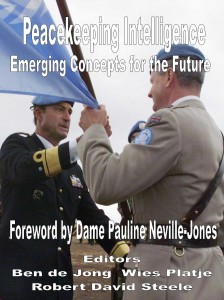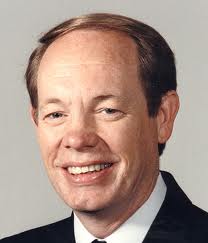Senator General Franklin E. van Kappen was a transitional and tranformational figure as Military Advisor to the Secretary General of the United Nations, setting the stage for General Patrick Cammaert and the campaign to implement the Brahimi Report recommendations and establish intelligence (decision-support) as an acccepted term of art in UN circles.
Strategic Intelligence and the United Nations
Senator van Kappen was born in 1941 in Semarang, the former Dutch East Indies (Indonesia). He is married and has two sons.
In 1964 he graduated from the Naval Academy in Den Helder and was commissioned as a 2nd Lieutenant in the Royal Netherlands Marine Corps.
In the course of his career he completed Special Forces (Commando) training with the Green Berets in the Netherlands and the United Kingdom and was trained as a Mountain and Arctic Warfare Survival Instructor in Norway. He was also trained as a Naval communications and warfare officer and is a graduate of the U.S. Naval War College in Newport, R.I.(USA). During his career he served in numerous operational and staff billets in the Netherlands and abroad.
His two last postings are listed below.
In July 1992 he was promoted to Brigadier-General and assumed command of the Netherlands Forces in the Caribbean and of a joint US/Netherlands Task Group working Counter Drug operation in the Caribbean. He is also one of the founders of the Coast Guard for the Netherlands Antilles and Aruba.
In 1995 he was promoted to Major-General and served simultaneously as the top Military Adviser to the Secretary General of the U.N. and as the Director of the Military Division in the Department of Peacekeeping Operations at U.N. headquarters in New York. He provided daily input into the management of all active UN peacekeeping operations. He also directed the planning process to field new operations as mandated by the Security Council.
In August 1998, Major-General van Kappen returned to the Netherlands and retired from the Marine Corps. From 2004 until 2008 he worked as a Senior Mentor for NATO and the Multinational Planning Augmentation Team (MPAT) programme sponsored by US Pacific Command to enhance regional cooperation and multinational force readiness for Crisis Response in the Asia Pacific Region.
From 2007 until to date he works as Senior Concept Developer for NATO/ACT. He is a Senior Policy Advisor for the Netherlands Organisation for Applied Scientific (Defence) Research (TNO) and the The Hague Centre for Strategic Studies (HCSS). He is the chairman of the supervisory board of the Institute for Security, Experimentation and Transformation Institute (ISETI). In 2007 he was elected to take a seat in the Senate of the Kingdom of the Netherlands. He lectures internationally as an expert on security issues.






